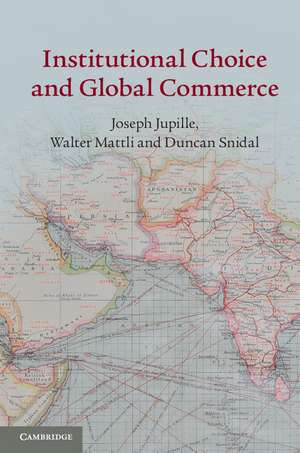Institutional Choice and Global Commerce
Autor Joseph Jupille, Walter Mattli, Duncan Snidalen Limba Engleză Paperback – 28 aug 2013
Preț: 173.17 lei
Preț vechi: 192.94 lei
-10% Nou
Puncte Express: 260
Preț estimativ în valută:
33.13€ • 34.60$ • 27.36£
33.13€ • 34.60$ • 27.36£
Carte indisponibilă temporar
Doresc să fiu notificat când acest titlu va fi disponibil:
Se trimite...
Preluare comenzi: 021 569.72.76
Specificații
ISBN-13: 9781107645929
ISBN-10: 1107645921
Pagini: 265
Ilustrații: 10 b/w illus. 8 tables
Dimensiuni: 152 x 228 x 12 mm
Greutate: 0.44 kg
Ediția:New.
Editura: Cambridge University Press
Colecția Cambridge University Press
Locul publicării:New York, United States
ISBN-10: 1107645921
Pagini: 265
Ilustrații: 10 b/w illus. 8 tables
Dimensiuni: 152 x 228 x 12 mm
Greutate: 0.44 kg
Ediția:New.
Editura: Cambridge University Press
Colecția Cambridge University Press
Locul publicării:New York, United States
Cuprins
Part I: 1. Introduction: institutional choice and global commerce; 2. International institutional choice: cooperation, alternatives, and strategies; 3. Building Theseus' ship: why the ITO failed, the GATT succeeded, and the WTO emerged; Part II: 4. Creating the first international court of commercial dispute resolution: the Mixed Courts of Egypt; 5. Commercial complexity and institutional choice in the GATT era; 6. Institutional choice in global accounting governance; Part III: 7. Conclusion: overview and institutional theories compared.
Recenzii
'Jupille, Mattli, and Snidal have written a pathbreaking book on the politics of institutional choice relating to global commerce. Developing a novel approach grounded in bounded rationality, the authors demonstrate why the process of institutional change is often piece-meal, disjointed, and inefficient judged by standards of global efficiency.' James Caporaso, Director of the European Union Center for Excellence, University of Washington, Seattle
'Jupille, Mattli and Snidal provide us with one of the most cogent and comprehensive accounts of institutional choice and change to date. Melding together historical institutionalism with more rationalist accounts of politics, the book explains why institutional reform is difficult and should not be expected under 'normal' conditions. This is critical reading for all scholars of international relations.' Judith Goldstein, Janet Peck Professor of International Communication and Professor of Political Science, Stanford University
'The authors provide a novel theoretical approach to a world of proliferating international institutions that frequently underperform. They illuminate institutional creation, persistence, and change in the face of a constantly evolving global agenda.' Miles Kahler, University of California, San Diego
'In this interesting and rich new book, Jupille, Mattli and Snidal stake out a theoretically-principled approach to international institutions between pure rational design and pure path-dependency. In their theory, actors are boundedly rational and usually rely on existing institutions or modify them slightly, even when the institutions are suboptimal. But, as the authors show, there are specific, predictable circumstances when they will try to craft new institutions to meet new problems. This clear, readable analysis weaves together theory and empirical tests to shed new light on why institutions persist, why new ones are built, and how states select and use international institutions.' Charles Lipson, Peter B. Ritzma Professor in Political Science, University of Chicago
'Jupille, Mattli and Snidal provide us with one of the most cogent and comprehensive accounts of institutional choice and change to date. Melding together historical institutionalism with more rationalist accounts of politics, the book explains why institutional reform is difficult and should not be expected under 'normal' conditions. This is critical reading for all scholars of international relations.' Judith Goldstein, Janet Peck Professor of International Communication and Professor of Political Science, Stanford University
'The authors provide a novel theoretical approach to a world of proliferating international institutions that frequently underperform. They illuminate institutional creation, persistence, and change in the face of a constantly evolving global agenda.' Miles Kahler, University of California, San Diego
'In this interesting and rich new book, Jupille, Mattli and Snidal stake out a theoretically-principled approach to international institutions between pure rational design and pure path-dependency. In their theory, actors are boundedly rational and usually rely on existing institutions or modify them slightly, even when the institutions are suboptimal. But, as the authors show, there are specific, predictable circumstances when they will try to craft new institutions to meet new problems. This clear, readable analysis weaves together theory and empirical tests to shed new light on why institutions persist, why new ones are built, and how states select and use international institutions.' Charles Lipson, Peter B. Ritzma Professor in Political Science, University of Chicago
Notă biografică
Descriere
Why do institutions emerge, change, persist and die? This book challenges conventional theoretical views using the history of global commerce.
